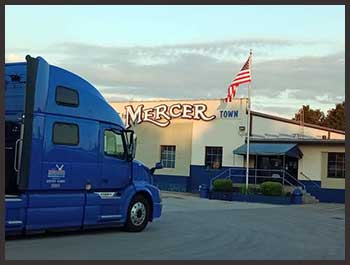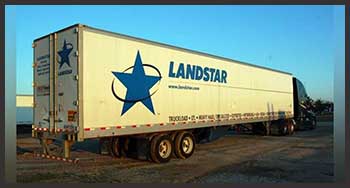The trucking industry moves over 70% of all freight in the United States, representing a massive $796 billion market. With so much on the line, shippers need to partner with reputable freight brokers who can reliably connect them with carriers to haul their loads.
Two of the largest freight brokers to consider are Mercer Transportation and Landstar. But with both being major players, how do you choose between them?
In this comprehensive guide, we’ll compare Mercer and Landstar across key factors like company history, services, technology, and costs.
Whether you’re a shipper needing to move full truckloads or a carrier looking for loads, read on to decide which broker may be the better fit.
A Brief Comparison Table
| Particulars | Mercer Transportation | Landstar |
| Company Type | Private, family-owned | Publicly traded |
| Years in Business | 75+ years, founded 1947 | 54+ years, founded 1968 |
| Headquarters | Louisville, KY | Jacksonville, FL |
| Annual Loads | Tens of thousands | Over 1 million |
| Carriers | 10,000+ | 50,000+ |
| Services | FTL, temperature-controlled, household moving | FTL, flatbed, expedited, intermodal |
| Technology | Proprietary TMS MerceriX | AS/400, Landstar eServices portal |
| Customer Service | More personalized touch | Very reliable despite size |
| Rates | Competitive pricing for shippers, 8-12% markup for carriers | Slim margins benefit shippers and carriers |
| Best For | Specialized freight, small/mid-size shippers | All freight types, very large shippers |
Getting To Know Mercer Transportation And Landstar
First, let’s start with some background on each company.

Mercer Transportation was founded in 1947 in Louisville, Kentucky by Lee Mercer Sr. Still family-owned and operated today, they have over 75 years of experience in the transportation industry. Mercer arranges the movement of tens of thousands loads per year across the continental US and Canada. They connect shippers to their network of over 10,000 pre-qualified carriers.
Landstar began in 1968 as a small firm in Jacksonville, Florida called Landstar Poole, Inc. It reorganized as Landstar System, Inc. in 1991. Now publicly traded on NASDAQ, Landstar is one of the largest freight brokers globally. They have over 1,200 employees and 50,000 trucking companies signed on to haul loads under the Landstar brand. Their massive scale gives them capacity to handle over 1 million loads per year.
Both brokers have been around for decades and have earned positive reputations in the trucking marketplace. But with Mercer being a private family company versus Landstar operating as a public corporation, there are some differences to how each approaches the business.
Mercer Transportation And Landstar: Key Features Compared
Comparing Services Offered
Mercer and Landstar both focus on arranging full truckload (FTL) transportation. This means they contract with shippers to haul entire trailers worth of cargo from origin to destination. They then find carriers in their networks to take on the loads.
However, each broker offers slightly different service options beyond basic FTL:

- Mercer provides managed transportation solutions, brokerage of temperature-controlled freight, transloading services, and freight bill auditing. Their household goods/specialty moving division handles moving families’ possessions.
- Landstar offers logistics services like expedited ground and air shipping, freight forwarding, and pipeline/hazmat transportation. They broker flatbed, step deck, heavy haul, and rail intermodal loads in addition to dry van FTL.
So while both handle conventional FTL truckload service, Landstar provides a wider array of logistics services – from intermodal rail to expedited air charters. Mercer’s focus seems to be more on specialty equipment freight and household relocation.
Technology and Efficiency
Running a smooth freight brokerage operation requires advanced technology to match loads with the best carriers. Mercer and Landstar both invest heavily in IT, but their systems have key differences:
- Mercer built their own fully-customizable transportation management system called MerceriX. It integrates load tracking, carrier communications, and documentation on one platform. Drivers can upload paperwork directly from the road.
- Landstar uses a proprietary system called AS/400 to post loads for carriers. They also provide app and messaging options to remain in constant contact. Carriers upload documentation through Landstar’s Rapid Pay program, allowing quick invoicing.
While Mercer seems to leverage more modern, flexible tech, Landstar’s systems have also proven reliable for years. Where Landstar shines is providing shippers with complete shipment visibility through their Landstar eServices portal. Overall, both brokers combine technology effectively with human interaction to meet customer needs.
Carrier Networks and Capacity
The best freight brokers have vast carrier networks they can tap into to cover loads. Both Mercer and Landstar have tens of thousands of carriers onboard:
- Mercer has over 10,000 contracted trucking companies in their system. They vet each carrier to guarantee reliability and safety compliance.
- Landstar boasts the largest carrier base in the industry at over 1,200 employees and 50,000 carriers, from owner-operators to large fleets. They can instantly access capacity across North America.
With far more carriers and agents at their disposal, Landstar has the clear advantage when it comes to readily available capacity. Almost no shipment is too large for them to handle. Mercer still maintains an above average carrier network, but it may struggle matching Landstar for flexibility on the biggest loads.
Also Read: Differences Between Landstar Inway And Ranger.
Pricing and Pay Rates
On top of service differences and technology, one of the biggest factors shippers weigh is cost, while carriers care about pay rates. How do Mercer and Landstar compare on pricing?
- Mercer touts competitive pricing by leveraging their volume discounts as one of the largest brokers. They focus on keeping shipper costs low rather than boosting margins. For approved carriers, they advertise rates at 8-12% above fuel surcharges.
- Landstar says their massive scale allows them to offer shippers attractive pricing. They pay carriers at above-market rates, likely to incentivize capacity. Landstar is known for running very slim margins, benefitting shippers and carriers.
Both brokers pitch themselves as cost-leaders in the industry. But firms must be compared individually on bid pricing for each specific customer. Either broker could potentially offer better shipment rates or carrier pay depending on the freight lane and their current capacity needs.
Customer Service Reputation
At the end of the day, shippers choose brokers based on customer service and reliability at a fair price. How do Mercer and Landstar stack up reputation-wise?
- Mercer gets high marks for family-owned service. Many reviews praise their responsive team that truly cares about their shipper and carrier customers. They’ve maintained long-term business relationships thanks to their customer focus.
- Landstar also draws many positive reviews for prompt shipper/carrier assistance and fast payment. Their scale and technology allow them to provide consistent service. Some shippers say it’s tougher to contact staff at Landstar versus smaller brokers, however.
In general, both brokers are regarded as two of the best in the industry when it comes to customer service. Mercer’s family-owned approach may give them an edge for a more personal touch.
But Landstar’s scale lets them handle almost any customer request. Most shippers and carriers are satisfied with either option. Also watch this video!
Frequently Asked Questions (FAQ)
Landstar generally takes a percentage of between 15-30% from the total freight rate as a brokerage fee. Their commissions tend to fall at the lower end of the typical 20-35% range most brokers deduct. Because they handle such high shipping volumes, they can operate on thinner margins.
Mercer has been family-owned and operated since 1947. They have over 75 years of experience as a leading freight brokerage.
Landstar System, Inc. is a publicly traded company listed on NASDAQ. No single person or entity owns a majority stake. The company’s biggest shareholders are investment management firms like The Vanguard Group and BlackRock.
Landstar pay rates vary depending on factors like freight type, route/mileage, and current market conditions. In general, carriers report Landstar pays $1.50 – $2.50+ per mile for dry van truckload moves. Their rates typically fall on the higher end for brokers.
Also Read: Comparison Between Indiana Transport And Horizon Transpot.
The Verdict
With this overview of how Mercer and Landstar compare, how do you decide which freight broker may be a better fit?
For shippers moving full truckloads, Landstar may be preferable if you:
- Require proven capacity for very large shipments
- Need a wider array of logistics services beyond truckload
- Value shipment visibility through tech like Landstar’s eServices
Meanwhile, Mercer may better meet shipper needs in these cases:
- Your shipments are centered around specialized equipment like flatbeds
- You ship produce or other temperature-controlled goods
- You value personalized service and relationship-building
For carriers, Landstar is likely the better option if you:
- Own mostly dry vans and want year-round load availability
- Prefer technology-focused brokerages that allow self-service
- Need fast payment turnaround, such as through Rapid Pay
Carriers may favor Mercer if they:
- Specialize in flatbed, step deck, or temp controlled freight
- Want the close relationships of a family-owned broker
- Prefer brokers with the lowest margins to boost pay
As two of the country’s largest brokers for full truckload freight, both Mercer and Landstar have distinct strengths. Choose the one that best aligns with your business goals, needs and philosophy.
There’s no universally “better” option – the right broker depends entirely on your specific shipping requirements. By comparing them head-to-head, you can make an informed choice.
So in summary, when choosing between the two major freight brokers Mercer and Landstar, weigh factors like services offered, technology, carrier networks, pricing, and customer service reputation. Consider which best aligns with your shipping or capacity needs. Both brokers can make for excellent partners in the full truckload marketplace.

